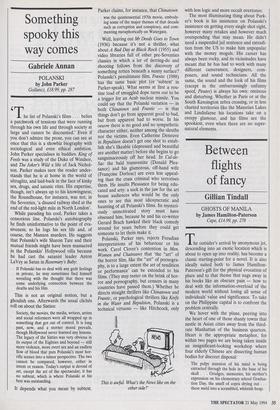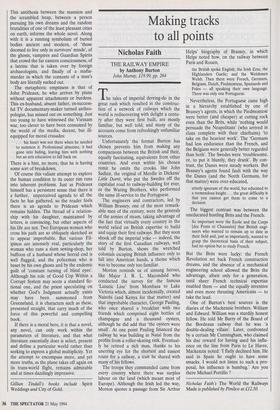Between flights of fancy
Gillian Tindall
GHOSTS OF MANILA by James Hamilton-Paterson Cape, £14.99, pp. 278 The outsider's arrival by anonymous jet, descending into an exotic location which is about to open up into reality, has become a classic starting-point for a novel. It is also ideally suited both to James Hamilton- Paterson's gift for the physical evocation of place and to that theme that nags away in his books like an obscure pain — how to deal with the information-overload of the modern world without losing all sense of individuals' value and significance. To take on the Philippine capital is to confront the problem centrally.
We hover with the plane, peering into the heart of one of those shanty towns that nestle in Asian cities away from the third- rate Manhattan of the business quarters. Heart is the appropriate metaphor, for within two pages we are being taken inside an insignificant-looking workshop where four elderly Chinese are dissecting human bodies for discreet disposal: The pulpy mansion of his mind is being extracted through the hole in the base of his skull . . Grudges, memories, his mother's expression on his elementary school Gradua- tion Day, the smell of copra drying out . . . these meld into a scrambled, whiteish heap. This antithesis between the mansion and the scrambled heap, between a person pursuing his own dreams and the random brutalities of one of the least pleasant cities on earth, informs the whole novel. Along with it is a running symbolism of buried bodies ancient and modern, of 'those doomed to live only in survivors' minds', of the ghosts, vampires and Guardian Spirits that crowd the far eastern consciousness, of a latrine that is taken over by foreign archaeologists, and finally of a mafia- murder in which the contents of a man's body are literally sucked out.
The metaphoric emptiness is that of John Prideaux, he who arrives by plane without apparent attachments or burdens. This ex-husband, absent father, ex-success- ful TV documentary-maker turned anthro- pologist, has missed out on something. Just too young to have witnessed the Vietnam war, too clever to have been consumed by the world of the media, decent, but ill- equipped for moral crusades: . .. his heart was not there when he needed to summon it. Professional absentee, it had gone into hiding, leaving him with nothing but an arts education to fall back on.
There is a hint, no more, that he is having some sort of breakdown.
Of course this valiant attempt to explore the human condition to its outer rim runs into inherent problems. Just as Prideaux himself has a persistent sense that there is a further, unperceived agenda to all the facts he has gathered, so the reader feels there is an agenda to Prideaux which remains hidden. The thread of a relation- ship with his daughter, maintained by letters, is convincing, but other aspects of his life are not. Two European women who cross his path are so obliquely sketched as to appear improbable. But various Fil- ipinos are intensely real, particularly the woman who runs a slum sewing-shop, her buffoon of a husband whose horrid end is well flagged, and the policeman who is beset by his own ghosts and by the endemic guilt of 'constant turning of blind eyes'. Although his role of Good Cop Within a Corrupt System may seem a standard fic- tional one, and the priest speculating on whether God's Judgment actually exists may have been summoned from Greeneland, it is characters such as these, presented straight, that carry much of the force of this powerful and compelling book.
If there is a moral here, it is that a novel, any novel, can only work within the parameters of literature, and that what literature essentially does is select, present and define a particular world rather than seeking to express a global multiplicity. Yet the attempt to encompass more, and yet more truths, as the plane takes off again on its trans-world flight, remains admirable and at times dazzlingly impressive.
Gillian Tindall's books include Spirit Weddings and City of Gold.





































































 Previous page
Previous page